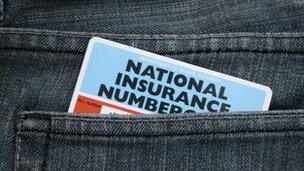Budget 2013: National Insurance, the Cinderella tax
- Published

National Insurance Contributions amount to a hidden cost of employment
National Insurance Contributions (NICs) are the Cinderella tax.
They raised £101bn for the government's coffers in 2011-12, almost a quarter of all tax receipts, but they are poorly understood and rarely emerge into the spotlight.
This Budget has changed all that.
The Chancellor's headline announcement is a generous NICs relief for employers, wiping away the first £2,000 of their employer NICs
From 2014-14 this will cost the government an initial £1.26bn, rising to £1.73bn three years afterwards.
But that will be more than offset by a huge rise in the government's income from NICs elsewhere in the tax jungle.
As a result of the decision to introduce a single-tier national state pension, the complicated system of "contracting out" will end.
This means that, in particular, public sector employers and their staff will have to pay higher NICs from 2016-17.
And this will raise a whopping £5.5bn that year alone.
The new relief
For employers, NICs are a heavy levy, charged at 13.8% of most pay. They amount to a hidden cost of employment.
At a stroke, this new relief, called the National Insurance Employment Allowance, removes the "jobs tax" on millions of small businesses, and is likely to encourage one-man businesses to take on their first employee.
Hopefully it will provide a welcome spur to real employment.
The relief is particularly beneficial for those over state pension age, as they are also not required to pay employee NICs.
This Budget may thus give a welcome boost to the job prospects of elderly people seeking work after retirement, and encourage this sector of the population to remain in employment.
Tightening the NICs net
To balance this generous relief, there are some new ways of collecting more NICs.
These include a new attack on limited liability partnerships (LLPs).
LLP partners, generally in professional firms such as lawyers and accountants, are treated as self-employed by the tax system, and this reduces the NICs they pay.
This Budget has announced the sweeping away of this presumption, so as to "tackle the disguising of employment relationships" - in other words, labelling people as partners to get the NICs break, when they are really employees who should be subject to higher NICs.
There will also be new measures aimed at those working via an offshore company.
These companies often supply workers to UK businesses, but rely on their overseas status not to pay NICs on the employees' wages.
Tax avoidance
Partnerships that use commonplace tax planning arrangements, such as making a company a partner in the partnership, are also targeted.
Although this may look odd to the man in the street, this is a widely used tax-avoidance mechanism.
The government will also make it harder for businesses involved in using tax avoidance schemes to get government work.
This was to have been be a backward looking test, looking at what firms had done in the past 10 years.
Now, though, potential government contractors will only be scrutinised on their behaviour in the future, which should be an effective deterrent.
This new procurement protocol is likely to deter many businesses from involvement in schemes and arrangements which might fall foul of tax avoidance law.
All this is on top of the General Anti-avoidance Rule ('GAAR'), which will come in from April; more agreements targeted at offshore jurisdictions; and changes to the punishments meted out to those who promote tax-avoidance schemes.
Bed and breakfasting
In the undergrowth of the Budget is an attack on loans made by small owner-managed businesses to their shareholders.
The existing law taxes these loans if they are outstanding at the end of the year.
For decades, it has been possible to get round these rules by paying the loan back a day or two before the year end, and then borrowing it back again a few days later.
This is known as bed and breakfasting. As a result, the shareholder could enjoy the money tax free.
The government has now announced anti-avoidance measures targeted at this bed and breakfasting, as well as other more complex loan related planning arrangements.
There is good news for investors, with the complete abolition of stamp duty on shares traded on the Alternative Investment Market.
Small businesses benefit from confirmation that they can use the "cash basis" for their tax returns, instead of the more complicated accounting rules which they have had to use previously.
The opinions expressed are those of the author and are not held by the BBC unless specifically stated. The material is for general information only and does not constitute investment, tax, legal or other form of advice. You should not rely on this information to make (or refrain from making) any decisions. Links to external sites are for information only and do not constitute endorsement. Always obtain independent professional advice for your own particular situation.